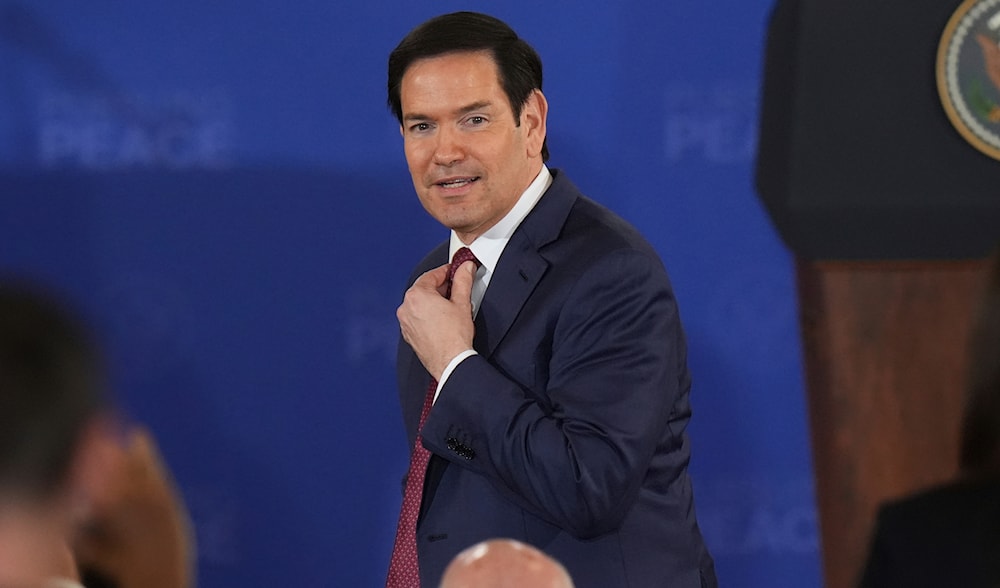6,000 student visas revoked under Rubio, US State Dept says
The revoked student visas concern Chinese students and pro-Palestine activists targeted under a Cold War-era law as part of Trump’s broader immigration crackdown.
-

US Secretary of State Marco Rubio arrives for a joint press conference with US President Donald Trump and Russia's President Vladimir Putin at Joint Base Elmendorf-Richardson, Alaska, Friday, Aug 15, 2025 (AP)
The US State Department has revoked 6,000 student visas since Marco Rubio took office as Secretary of State in January 2025, AFP reported. The policy, grounded in a Cold War-era law, marks an unprecedented escalation in targeting international students as part of President Donald Trump’s broader mass deportation strategy.
Rubio, who also serves as acting National Security Advisor, has invoked Section 237(a)(4)(C)(i) of the Immigration and Nationality Act of 1952, which allows the Secretary of State to deport non-citizens whose presence is believed to have adverse foreign policy consequences. The statute requires only a "reasonable ground to believe" standard.
A State Department official said Monday that the visa revocations primarily targeted students accused of overstaying, criminal activity, or support for terrorism. "The State Department has revoked over 6,000 student visas for overstays and law violations, the vast majority being assault, DUI, burglary and support for terrorism," the official told Fox News Digital.
The crackdown has affected over 240 universities, including Columbia, Harvard, Stanford, and several public institutions. Universities report growing anxiety among international students, with some schools filing lawsuits challenging the administration's tactics.
Political motives, campus protests
Critics argue that many of these revocations are politically motivated, particularly against students engaged in campus protests. A significant number of those affected participated in demonstrations critical of "Israel" and its war crimes in Gaza.
Rubio, echoing the administration's rhetoric, has referred to such students as "lunatics", asserting, "Every time I find one of these lunatics, I take away their visas."
Focus on Chinese students
Rubio has also explicitly targeted Chinese nationals, announcing efforts to revoke visas of those with alleged links to the Communist Party or who are studying in fields deemed sensitive. As of 2024, nearly 277,000 Chinese students were enrolled in US institutions.
High-profile detentions
Among the high-profile cases are Mahmoud Khalil, a legal permanent resident and Columbia University graduate student, and Rumeysa Ozturk, a Turkish doctoral candidate at Tufts University.
Khalil, who led pro-Palestine protests, was detained for over 100 days before being released in June. He has since filed a $20 million lawsuit, alleging political persecution. Ozturk was detained in March after co-authoring a newspaper op-ed critical of "Israel" and released in May by a federal judge who found her detention unconstitutional.
Legal concerns, international backlash
Legal experts and civil rights groups warn that the administration’s actions raise serious constitutional concerns. Reports have emerged of "silent revocations", in which students receive no prior notice and have their records deleted from federal databases, bypassing university oversight and eliminating due process.
Federal judges have found that some detentions violated First Amendment rights, reinforcing the principle that constitutional protections apply to all persons in the US, regardless of immigration status.
Internationally, the policy has strained diplomatic ties. China has condemned the actions as discriminatory and politically motivated. Critics also warn that the measures undermine America's "soft power" by deterring foreign talent from pursuing education in the US.
Pause in visa processing
In May 2025, the State Department temporarily paused new student visa processing while implementing stricter social media vetting procedures, deepening concerns about surveillance and profiling.
Additionally, the 6,000 revocations mark a sharp increase from earlier in the year, when Rubio confirmed at least 300 revocations in March. By April, estimates ranged between 1,400 and 1,700, underscoring the aggressive pace of the crackdown.
This policy shift reflects the Trump administration's ongoing strategy to weaponize immigration enforcement for ideological and foreign policy goals, using outdated legal tools to target perceived dissenters and suppress campus activism.

 4 Min Read
4 Min Read








